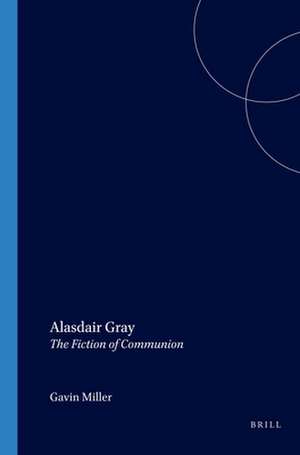Alasdair Gray: The Fiction of Communion: SCROLL: Scottish Cultural Review of Language and Literature, cartea 4
Autor Gavin Milleren Limba Engleză Paperback – 31 dec 2004
Din seria SCROLL: Scottish Cultural Review of Language and Literature
- 18%
 Preț: 761.53 lei
Preț: 761.53 lei -
 Preț: 405.28 lei
Preț: 405.28 lei - 15%
 Preț: 525.78 lei
Preț: 525.78 lei -
 Preț: 362.20 lei
Preț: 362.20 lei - 18%
 Preț: 642.29 lei
Preț: 642.29 lei - 18%
 Preț: 606.41 lei
Preț: 606.41 lei - 18%
 Preț: 692.86 lei
Preț: 692.86 lei - 18%
 Preț: 551.06 lei
Preț: 551.06 lei - 15%
 Preț: 439.01 lei
Preț: 439.01 lei - 18%
 Preț: 610.38 lei
Preț: 610.38 lei - 18%
 Preț: 565.90 lei
Preț: 565.90 lei - 15%
 Preț: 525.12 lei
Preț: 525.12 lei - 18%
 Preț: 533.06 lei
Preț: 533.06 lei - 15%
 Preț: 464.86 lei
Preț: 464.86 lei - 15%
 Preț: 370.81 lei
Preț: 370.81 lei - 15%
 Preț: 439.01 lei
Preț: 439.01 lei - 15%
 Preț: 391.30 lei
Preț: 391.30 lei
Preț: 263.81 lei
Nou
Puncte Express: 396
Preț estimativ în valută:
50.49€ • 52.44$ • 41.94£
50.49€ • 52.44$ • 41.94£
Carte indisponibilă temporar
Doresc să fiu notificat când acest titlu va fi disponibil:
Se trimite...
Preluare comenzi: 021 569.72.76
Specificații
ISBN-13: 9789042017573
ISBN-10: 9042017570
Dimensiuni: 150 x 220 mm
Greutate: 0.26 kg
Editura: Brill
Colecția Brill
Seria SCROLL: Scottish Cultural Review of Language and Literature
ISBN-10: 9042017570
Dimensiuni: 150 x 220 mm
Greutate: 0.26 kg
Editura: Brill
Colecția Brill
Seria SCROLL: Scottish Cultural Review of Language and Literature
Cuprins
Acknowledgements
Introduction
Chapter One: Lanark, The White Goddess, and “spiritual communion”
Chapter Two: The divided self – Alasdair Gray and R.D. Laing
Chapter Three: Reading and time
Conclusion: How “post-” is Gray?
Bibliography, Index
Introduction
Chapter One: Lanark, The White Goddess, and “spiritual communion”
Chapter Two: The divided self – Alasdair Gray and R.D. Laing
Chapter Three: Reading and time
Conclusion: How “post-” is Gray?
Bibliography, Index
Recenzii
”extremely interesting […] Reading Gray through Robert Graves’s White goddess theories is especially revealing, as is Miller’s keenness to view Gray through the prism of existentialism.” The Scottish Review of Books, Vol. 2, No. 1
